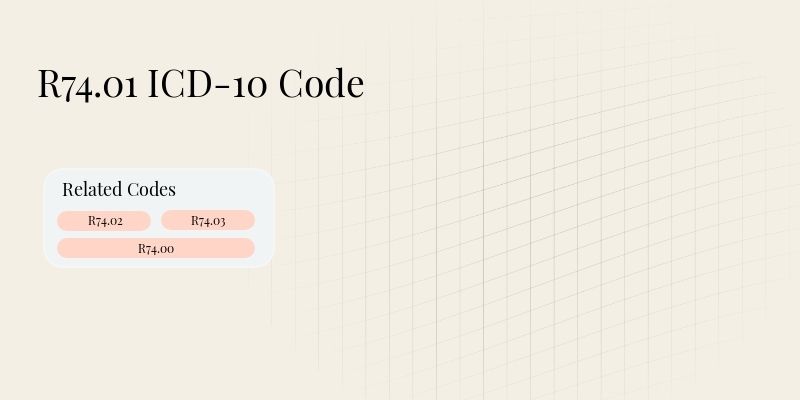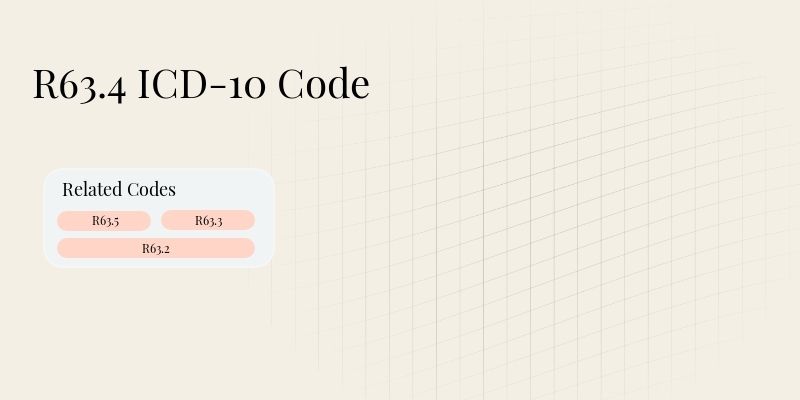
R74.01 ICD-10 Code: Transaminitis

Key Takeaways
- What R74.01 ICD-10 Code Covers: This code specifically addresses transaminitis, which refers to elevated liver enzymes indicating liver inflammation or damage, necessitating careful monitoring and management by healthcare providers.
- Session duration requirements: Documentation should reflect the time spent evaluating and managing the patient’s condition, ensuring that all services are appropriately justified for billing purposes.
- Who can use the code: This code can be employed by healthcare providers such as primary care physicians, gastroenterologists, and hepatologists who diagnose and treat liver-related conditions.
- Best practice for proper use: Clinicians should ensure accurate and thorough documentation of patient history, lab results, and treatment plans to support the use of this code and avoid potential audits.
- Example of actual usage: A patient presents with elevated ALT and AST levels during routine blood work, leading the physician to code R74.01 to indicate transaminitis for further investigation and management.
What is R74.01 ICD-10 Code
The R74.01 ICD‑10 code is designated for the diagnosis of transaminitis, which is characterized by elevated levels of liver enzymes such as alanine transaminase (ALT) and aspartate transaminase (AST). These elevations often signal inflammation or damage to the liver, making it essential for healthcare providers to assess the underlying causes and implement appropriate treatment strategies.
Transaminitis can arise from a variety of conditions, including viral hepatitis, fatty liver disease, alcohol‑related liver issues, and certain medications. The accurate coding of this condition is crucial for proper patient management, billing, and further diagnostic investigations.
Services Covered Under R74.01 ICD-10 Code
This code encompasses a range of services aimed at diagnosing and managing conditions associated with transaminitis. The following table highlights the key services associated with this code:
Service | Description |
|---|---|
Laboratory Testing | Blood tests to measure liver enzyme levels (ALT, AST) and other markers of liver function. |
Imaging Studies | Ultrasound or CT scans to visualize liver structure and identify potential abnormalities. |
Consultations | Specialist consultations for further evaluation of liver function or underlying causes of transaminitis. |
Follow-Up Visits | Regular follow-up appointments to monitor liver enzyme levels and patient symptoms. |
Who Can Use the R74.01 ICD-10 Code?
This code is applicable in various clinical settings. The following healthcare providers can use it:
- Primary Care Physicians: Responsible for the initial assessment and management of patients presenting with elevated liver enzymes.
- Gastroenterologists: Specialists who can further evaluate and treat liver-related conditions.
- Hepatologists: Experts in liver diseases who provide comprehensive care for patients with transaminitis and related conditions.
- Emergency Room Physicians: They may encounter patients with acute elevations in liver enzymes and must document the condition for treatment.
How to Use R74.01 ICD-10 Code
Using this code properly involves detailed documentation and accurate coding practices. Here are some key points to consider:
- Document Patient History: Include relevant medical history and symptoms. For example, a patient may have a history of alcohol use, which should be documented.
- Record Lab Results: Clearly note the specific enzyme levels that prompted the diagnosis. For instance, an ALT level of 150 U/L and AST level of 120 U/L should be indicated.
- Outline Treatment Plan: Describe the proposed management strategies, such as lifestyle changes or medications, to provide context for the diagnosis.
Reimbursement Rates for R74.01 ICD-10 Code
The following table provides a comparison of average reimbursement rates for this code between private and public insurance:
Insurance Type | Reimbursement Rate |
|---|---|
Private Insurance | $150 - $200 per visit |
Medicare | $120 - $180 per visit |
Medicaid | $100 - $150 per visit |
Disclaimer: Reimbursement rates are subject to change based on various factors including policy updates and regional differences. This article aims to provide average pricing information and will be updated as necessary.
Benefits of R74.01 ICD-10 Code
This code provides several benefits that improve patient care and administrative efficiency. The following table outlines these advantages:
Benefit | Description |
|---|---|
Accurate Diagnosis | Enables healthcare providers to identify liver-related issues promptly, allowing for timely interventions. |
Improved Patient Management | Facilitates personalized treatment plans that address the underlying causes of transaminitis. |
Enhanced Billing Accuracy | Prevents billing issues by providing clear documentation of the patient's condition and treatment. |
Data Tracking | Helps in collecting data for epidemiological studies on liver diseases, contributing to research and public health initiatives. |
Common Mistakes to Avoid with R74.01 ICD-10 Code
Misuse of this code can lead to significant risks, including audits and claim denials. It is crucial to avoid common pitfalls to ensure compliance and proper reimbursement. Here are some frequent mistakes:
- Inadequate Documentation: Failing to provide sufficient details about the patient's condition can lead to claim denials. For example, not noting relevant medical history or lab results may raise red flags during an audit.
- Incorrect Code Selection: Using a different code that does not accurately reflect the patient's condition can result in improper billing. For instance, coding for a more severe liver condition instead of transaminitis may misrepresent the patient's actual status.
- Failure to Update Records: Not updating patient records during follow-up visits can lead to inconsistencies in treatment plans. For example, if a patient's enzyme levels improve but are not documented, it may suggest ongoing issues inaccurately.
- Ignoring Guidelines: Not adhering to coding guidelines can result in penalties. For instance, failing to follow specific payer requirements for documentation can lead to claim rejections.
R74.01 ICD-10 Code vs other codes
When coding for liver‑related conditions, it is essential to differentiate transaminitis from other similar codes. The table below provides a comparative overview:
Code | Description | Key Differences |
|---|---|---|
R74.01 | Transaminitis | Focuses on elevated liver enzymes without specifying the cause. |
K76.0 | Fatty Liver | Specifically indicates liver fat accumulation, which may lead to transaminitis. |
K73.9 | Chronic Hepatitis, Unspecified | Indicates chronic inflammation but does not specify enzyme levels. |
K74.60 | Fibrosis of Liver, Unspecified | Focuses on liver scarring rather than enzyme elevation. |
Conclusion
The R74.01 ICD‑10 code for transaminitis is vital in the realm of medical coding for liver diseases. Understanding this code helps providers accurately diagnose and manage patients with elevated liver enzymes, ensuring appropriate treatment and follow‑up. Accurate documentation of patient history, lab results, and treatment plans is crucial for effective use of the code and for securing proper reimbursement.
Healthcare professionals must remain vigilant against common coding mistakes that could lead to audits or claim denials. By adhering to best practices and distinguishing transaminitis from similar conditions, providers can optimize their coding processes, ultimately enhancing patient care and operational efficiency.
Disclaimer: This article is for informational purposes only and does not constitute legal or medical advice. Always consult professional guidelines and regulatory bodies for specific compliance requirements.
Frequently Asked Questions
Reduce burnout,
improve patient care.
Join thousands of clinicians already using AI to become more efficient.

R63.4 ICD-10 Code: Abnormal weight loss
Discover essential insights on the R63.4 ICD-10 Code code for health professionals. Enhance your practice and navigate billing with confidence.

90849 CPT Code: Multiple-family group psychotherapy sessions
Discover essential insights on the 90849 CPT code for health professionals. Enhance your practice and navigate billing with confidence.

99401 CPT Code: Preventive Medicine Counseling, 15 minutes
Discover essential insights on the 99401 CPT code for health professionals. Enhance your practice and navigate billing with confidence.
